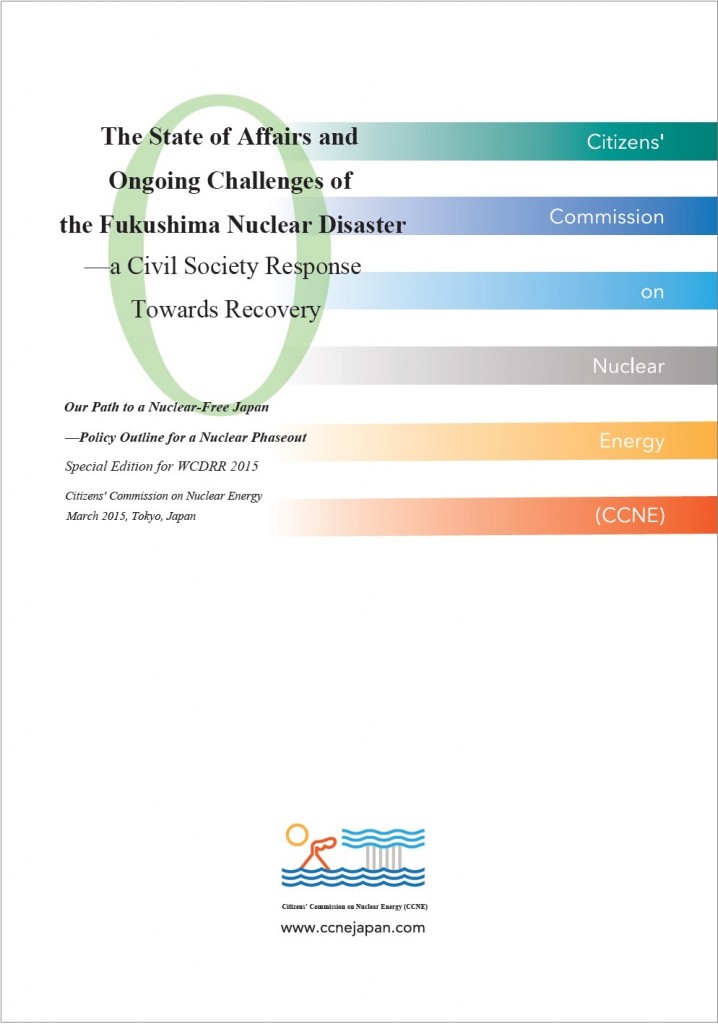![]()
|
国際放射線防護委員会(ICRP)は2023年11月6~9日、国際シンポジウム ‟ICRP2023” を開催する予定です. 原子力市民委員会ではICRP2023に関して、福島原発事故の被災者や市民、そして事故後の状況を詳細に把握している日本の研究者が広く参加できる場になることは、現在、基本勧告の改訂に向けた作業をおこなっているICRPにとっても有意義と考え、運営面での提案ならびに3つのセッションを提案するレター(英語) |
Werner Rühm, Chair, ICRP
Christopher Clement, Scientific Secretary, ICRP
Kai Michiaki, Member, ICRP
Kelsey Cloutier, Head of Stakeholder Engagement and Communications, ICRP
Dear Sirs,
We write to you on behalf of the Citizens Commission on Nuclear Energy (CCNE), a civil society think tank established in Japan after the Fukushima nuclear accident. We communicated with you in 2019 when ICRP conducted a public consultation on the draft of “Radiological Protection of People and the Environment in the Event of a Large Nuclear Accident” (Pub.146) to ensure that the new recommendations reflect the real lessons learned from the Fukushima disaster. We would like to thank you again for your consideration, during that compilation process, of the participation of the parties directly and variedly affected by the accident.
Now we welcome the ICRP’s 7th International Symposium on the System of Radiological Protection to be held in Japan from November 6th to 9th, 2023. We are writing to request some logistical arrangements and to propose three thematic sessions that should be added to the symposium.
Considering the fact that the symposium is held in the country where people have been experiencing the impacts of the Fukushima nuclear accident, and also the fact that the ICRP is currently working to revise the General Recommendations, we believe that it should be quite beneficial, not only for Japanese citizens, but also for the ICRP, to promote the participation of Japanese citizens and researchers who have a detailed understanding of the situation after the Fukushima crisis.
Therefore, we would like to take this opportunity to make the following proposals for ICRP 2023 in order to reassess the situation of the Fukushima disaster and to deepen the scientific evaluation of the impacts of the nuclear accident.
1) Logistical arrangements for the symposium
We believe the following logistical arrangement is key in promoting Japanese citizens’ participation in the symposium, especially for “Session 2: Dosimetry for the next General Recommendations”, “Session 4: How experience of the Fukushima Daiichi accident is improving RP”, and additional three sessions we propose later.
● These sessions should be held in Fukushima to ensure a broader participation of the residents directly affected by the accident.
● According to ICRP2023.jp, “In-person Sessions will NOT be streamed live for online registration.” The sessions, however, should be held in a hybrid format, or in-person sessions should be streamed, and comments and questions from citizens should be accepted to secure participation of Fukushima refugees from other parts of Japan.
● English-Japanese and Japanese-English interpreters should be provided.
● The length of the sessions should be at least doubled, considering the interpretation delay.
● The registration fee, 120,000 JPY for onsite and 50,000 JPY for online should be waivered or nominal for citizens participating in these Fukushima-related sessions.
2) Thematic session “Listening to citizens voices on Fukushima’s experiences: Reflection of ICRP 146”
In the consultation process of ICRP Pub.146, several public seminars were held by Japanese citizen groups, including CCNE, with the cooperation of ICRP members (we thank Dr. Kai and Dr. Honma in particular), which boosted the number of Japanese submissions commenting on the draft. While we appreciate that you reflected some of the comments into the ICRP146, we must say the description of the situations in Fukushima remains insufficient or partial from civil society points of view. Therefore, in addition to the “Session 4: How experience of the Fukushima Daiichi accident is improving RP”, in which selected scientists present their papers as indicated in your program, we propose another session to reexamine the radiological protection issues at the Fukushima accident from the general public viewpoint. We believe the following topics should be covered in the session and reflected in the forthcoming revision of the General Recommendations.
● Confusion over the scientific explanation of the health effects of radiation, such as LNT.
● Inconsistency in the Japanese government policy of radiation protection: for example, the reference level that remains without review even after 12 years, insufficient inclusion of stakeholders, etc.
● The physical and mental burdens of citizens caused by the nuclear disaster. Inviting citizens who have not participated in the ICRP dialogues so far can provide valuable insight.
3) Thematic session “Thyroid Cancer in Fukushima.”
The 2020/21 Fukushima Report published by UNSCEAR leaves room for criticism, particularly regarding its dose estimations, assessment of the results of thyroid examination, risk communication, etc. In revising ICRP’s General Recommendations, ensuring a scientific assessment based on a wider range of discussions is crucial. For this reason, we propose a session for scientific discussion of the health effect of the Fukushima accident focusing on the thyroid cancer cases detected in Fukushima. It would be a meaningful scientific discussion, open to the public, between the researchers of Fukushima Medical University who are the main authors of the UNSCEAR report, and the researchers who are critical of the UNSCEAR report.
4) Thematic session “Towards Revision of ICRP General Recommendations: a general public perspective”
Based on the sessions 2) and 3) proposed above, this session discusses specific elements that should be incorporated to the new General Recommendation to protect citizens from radiological harm, including human rights violations during nuclear emergency. This session will focus on the following topics.
● Confirm LNT as a scientific fact established by reliable large-scale radiation epidemiological studies, rather than a mere assumption.
● How to improve the decision-making process without excluding general public stakeholders.
● Basic discussion on the ALARA principle: Does economic compensation make amends for human rights violations?
As for the three sessions proposed above, we are ready to nominate appropriate speakers (citizens and scientists). It will be our pleasure to cooperate in organizing the symposium.
We would appreciate it if you could respond within April 2023. Thanking you in advance for your kind and earnest consideration.
Yours sincerely,
Kenichi Oshima, Chair, CCNE (Professor, Ryukoku University, Kyoto, Japan)
Shoko Murakami, Chief Secretary, CCNE
● Citizens’ Commission on Nuclear Energy (CCNE, eng.ccnejapan.com) is an independent research and advocacy body, established after the Fukushima disaster in order to draw out a comprehensive, ethical and viable policy to achieve nuclear power phaseout and solve related issues in Japan. The Commission is administered by the Takagi Fund for Citizen Science, Tokyo (an authorized charity corporation). CCNE currently consists of a board of 7 commissioners, three Working Groups (commissioners plus additional members), an advisory panel of experts and a secretariat. It has more than 80 members with a wide range of expertise such as social sciences, ethics, law, technologies (including nuclear engineering), environmental and medical sciences; the members also include a number of residents directly affected by the Fukushima nuclear accident 2011 and on.


